Duna

Lochmarin
Tue 13 Sep 2016 08:44
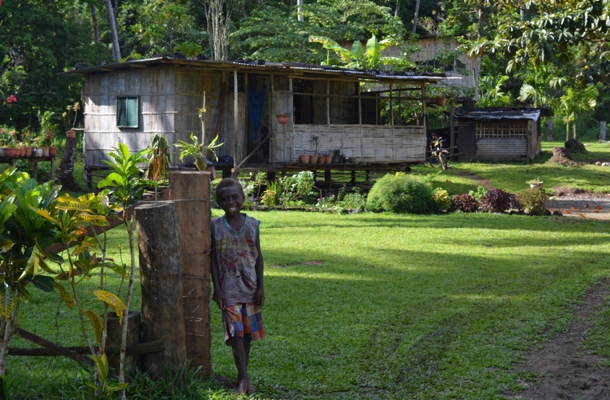 As is usual, we were welcomed by a young man fishing in his father's dug-out canoe. We asked the usual things: "Is it OK for us to stay here?”- "Yes, you’re very welcome”; “Will we be safe?”- “Yes, no Raskols here!”; ”May we visit the village?”-“Certainly, my father is a chief, he’s just at the shore here” and, last but not least “Are there any crocodiles?”- “No, no crocodiles. Except the one that lives over there.” No crocodiles except the one that lives the other side of the very small bay!! That’s one too many crocodiles for my liking. However, the children were playing in the shallows and the fishermen were out in their canoes so we decided that we’d probably be ok in our kayak to go and visit, so, packing a few gifts, off we went. It turned out the crocodile was only 4 feet or so (quite big enough to nip mind you!) and if he came near the village they chased him off. 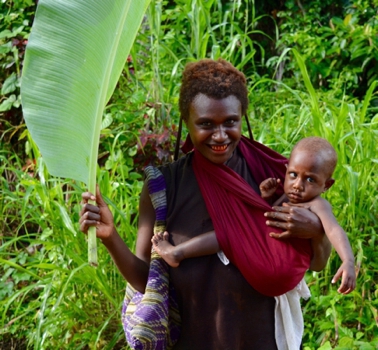 Banana leaf umbrella and betel nut smile. The things coming down from her hair either side are the straps from her bag - they carry them on their backs hung from their heads - keeps hands free for the pikinini! The village here has a yacht stay every two or three months, they are used to visitors and see them as a valued addition to their everyday lives. They like to exchange viewpoints and ideas, they value the opportunity to do a little trading and they are generous and warm in their welcome. Everywhere we went we exchanged cheerful greetings, warm handshakes and a few words. One lady came out of her house (which was surrounded by a gorgeous garden full of flowers) simply to present me with a sprig of flowers to take back to the boat. Another gave us a huge conch shell as a keepsake from the village. We weren’t hassled for trading but offered fruit and veg in a low key way, for which we were glad to trade generously. 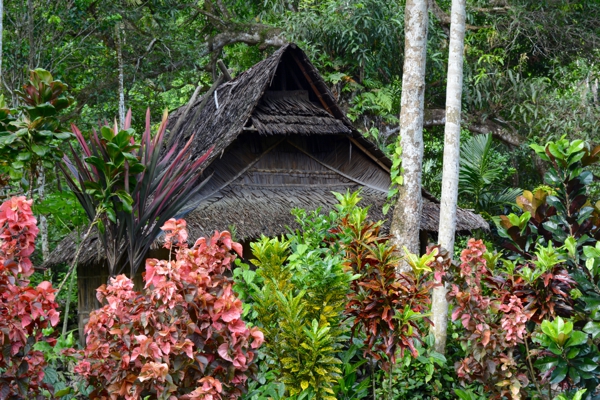 The young men’s house, young single men can come and live here when they feel they need to move out from their family homes, until they marry and build their own house. Young men from other villages can live in it too. Joel took us under his wing. He’s just 15 and he’s studying at high school, in Namatanai, further South on New Ireland, and he aims to become a lawyer. Along with Reuben, he was our escort whenever we needed him, and he tirelessly answered our many questions. Simon, a fisherman, became another good friend. Back in Australia, our generous friend Roger Saunders had given us two splendid crab pots he no longer needed. Phil and Simon took them off to set them, near the mangroves, rather near to the crocodile’s hang out I thought. He also showed us the best way to get our dinghy up to the village when we had things to bring that we didn’t want to risk on the kayak. This involved paddling up the river through the mangroves, quite an adventure in itself. 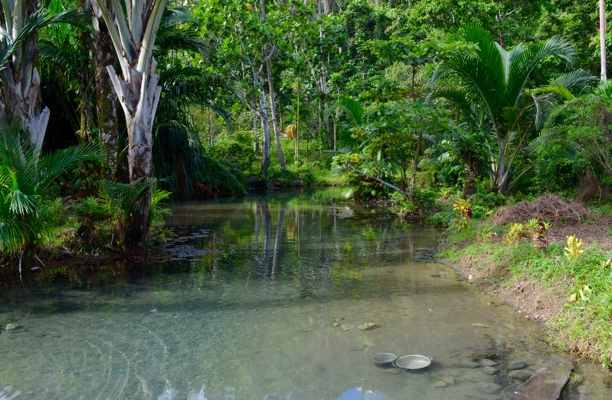 The river that runs through the village. It’s the place to wash clothes and pots, clean fish, shell nuts or just freshen up. Reuben kept us company whenever we wanted to go for a walk or find someone and we came to really enjoy his dry humour. It seemed to us that he was related to everyone: every house seemed to have another sister, or brother, or mother or aunt living in it. But our favourite relative of his was Judy, his sister (in law I think). She was such good company - she and I chatted so much, telling each other about our lives. Most days she would leave her chores and come and walk with us a while. 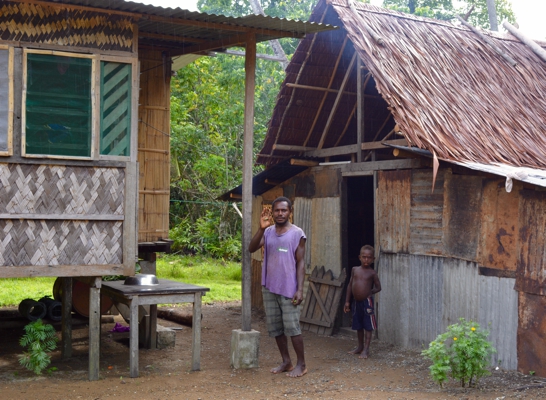 Simon outside the home he built, house to the left, kitchen to the right. We spent quite a lot of time at the elementary school. It was the most beautiful school we’ve seen so far - all kastom made with woven walls and thatched roof. It was very simple, a large blackboard in each class, a simple desk with benches running down each side in the middle of the room and a dirt floor. They had no reading books or text books at all, but some hardboard for the little ones to use as blackboards and paper, pencils and exercise books supplied by the government. Each days lesson was written on the board in faultless handwriting by the teacher. 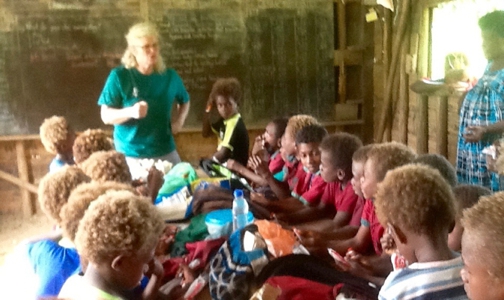 It was the school we’d been looking for. We’ve given books along the way but selectively. Some schools have had books already so we felt that ours would be better used elsewhere, others had none or a few but there was a litter of ripped pages on the ground at the back of the class that made me feel the books wouldn’t be looked after - they’d be wasted. Here all was neat and cared for, with teachers who had a real pride in their school and the achievement of their pupils, boasting a number of university graduates amongst the alumni. We were able to give plenty of text books along with a wide selection of reading books - some information books as well as fiction. Of course, the blackboard paint came out as well and we finished things off by me giving a talk on dental hygiene to the school, which sounds very formal but included singing songs, demonstration brushing of teeth made from carving a thing that was sold to us as a potato in Kokopo market (but it certainly wasn’t a potato, it was a sort of radish) and the kids getting marbles as treats when they contributed. We finished off by giving each child (and the adults who had come along to see what was happening, looking in through the window) a toothbrush and a small tube of toothpaste, which we’d brought all the way from New Zealand for just such a situation. 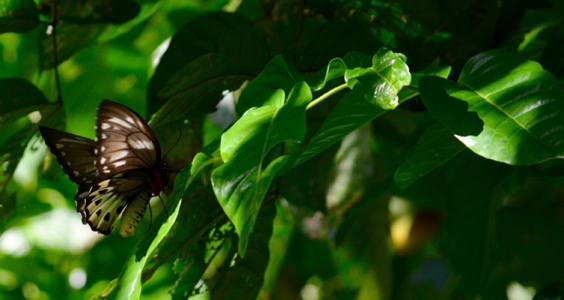 Butterflies in the jungle. Almost as soon as we’d arrived we’d seen some fascinating birds flying high up the hillside, with long yellow beaks - hornbills. They were black with yellow tails. Reuben and Joel offered to take us for a walk up a river to where we would be able to see them up close. We packed up our cameras and set off, acquiring an entourage of young men and an escort of pikininis. It was a stunning walk, with sunshine and showers along the way, laughter and chatter form the children, discussion and information from the young men along with Reuben’s special form of tongue in cheek humour. As we started to walk up the river the children were told to all go away, as their chatter would frighten the birds away. They went, with a little backchat here and there, and all flowed into the river, which was swollen from the rains, and they let themselves be carried along by the brown turbulent waters, or held onto an overhanging creeper whilst the cool floods, so much colder then the sea, flowed past them. 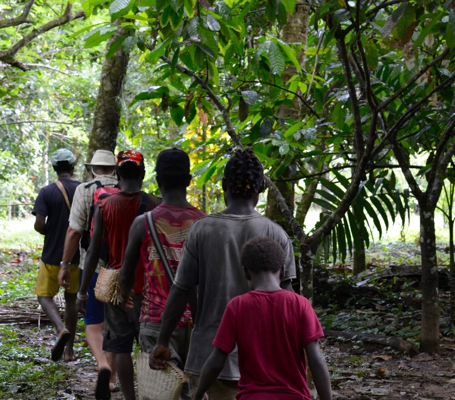 Our entourage, led by Rueben, Phil, and Joel. We saw the hornbills, and lots of different kinds of parrot, and colourful pigeons and flying foxes. But the rain had returned so we couldn’t risk our cameras in the downpour. Reuben took us up the hill a little to his gardens, telling us there were always lots of birds there, and indeed we saw some until the rain became so heavy that we took refuge in Reuben’s family shelter. It was peaceful sitting there, on woven mats, watching the rain whilst one of the young men smoked tobacco and the others chewed betel nuts. We caught some rainwater to slake our thirst - it’s mad how thirsty one gets in such a wet climate, and waited for the worst to pass. On the walk back Joel cut me a banana leaf umbrella and used more leaves to package up greens and papaya from the gardens for us. Thankful for all their help we offered them gifts from the boat. Joel wanted books and fishing gear. Reuben decided he’d rather have our kayak - it was strong and light, he explained. With a smile we refused his suggestion, feeling privileged that we could joke with folk there - their English is so good it makes conversation easy. We didn’t get the bird photos but it didn’t matter. We know we saw them. 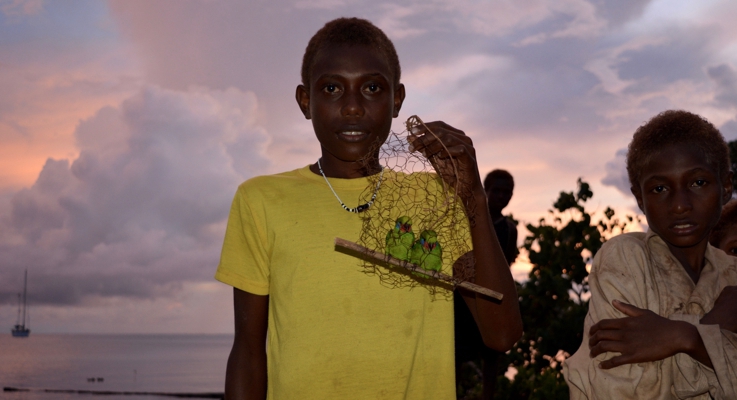 Hearing we were keen to see the birds, this kind young man climbed a tree to catch two baby parrots from the nest (Lochmarin is at anchor on the left). |